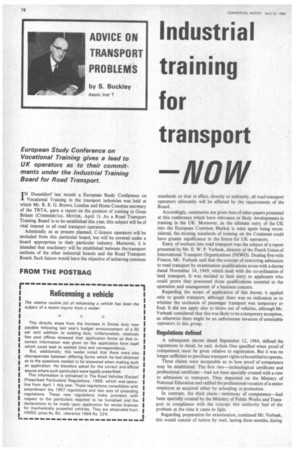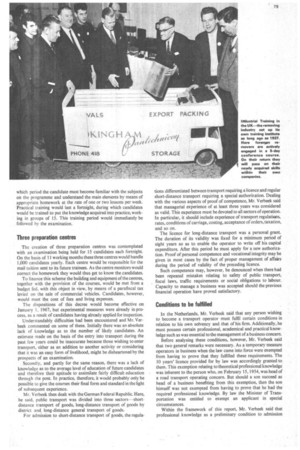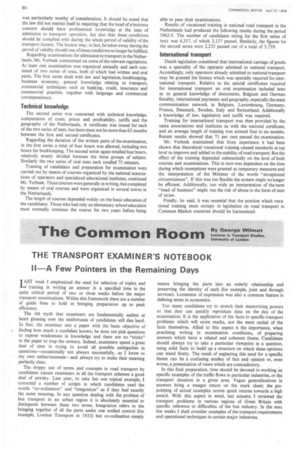Industrial training for transport
Page 80

Page 81

Page 82

If you've noticed an error in this article please click here to report it so we can fix it.
NOW
by S. Buckley
Assoc Inst T
European Study Conference on Vocational Training gives a lead to UK operators as to their commitments under the Industrial Training Board for Road Transport.
IN Dusseldorf last month a European Study Conference on 1Vocational Training in the transport industries was held at which Mr. R. E. G. Brown, London and Home Counties secretary of the TRTA, gave a report on the position of training in Great Britain (COMMERCIAL MOTOR, April 1). As a Road Transport Training Board is to be established this year, this subject will be of vital interest to all road transport operators.
Admittedly as at present planned, C-licence operators will be excluded from this particular board, but will be covered under a board appropriate to their particular industry. Moreover, it is intended that machinery will be established between the transport sections of the other industrial boards and the Road Transport Board. Such liaison would have the objective of achieving common standards so that in effect, directly or indirectly, all road transport operators ultimately will be affected by the requirements of the Board.
Accordingly, summaries are given here of other papers presented at this conference which have relevance to likely developments in training in the UK. Moreover, as the ultimate entry of the UK into the European Common Market is once again being reconsidered, the existing standards of training on the Continent could have greater significance in the future for UK operators.
Entry of workers into road transport was the subject of a report presented by Mr. E. W. P. Verbeek, director of the Dutch Union of International Transport Organizations (NIWO). Dealing first with France, Mr. Verbeek said that the concept of restricting admission to road transport by examination qualifications arose with a decree dated November 14, 1949, which dealt with the co-ordination of land transport. It was decided to limit entry to applicants who could prove they possessed those qualifications essential to the operation and management of a business concern.
Regarding the scope of application of this decree, it applied only to goods transport, although there was no indication as to whether the exclusion of passenger transport was temporary or final. It did not apply also to hirers out of vehicles, although Mr. Verbeek considered that this was likely to be a temporary exception, as otherwise there might be an unfortunate invasion of unsuitable operators in this group.
Regulations defined
A subsequent decree dated September 12, 1964, defined the regulations in detail, he said. Article One specified when proof of competence must be given relative to registration. But it was no longer sufficient to purchase transport rights to be entitled to operate.
Three claims were acceptable as to how proof of competence may be established. The first two—technological certificate and professional certificate—had not been specially created with a view to admission to transport. They depended on the Ministry of National Education and ratified the professional vocation of a senior employee as acquired either by schooling or promotion.
In contrast, the third claim—testimony of competence—had been specially created by the Ministry of Public Works and Transport in compliance with the concept this authority had of the problem at the time it came to light. Regarding preparation for examination, continued Mr. Verbeek, this would consist of tuition by mail, lasting three months, during which period the candidate must become familiar with the subjects on the programme and understand the main elements by means of appropriate homework at the rate of one or two lessons per week. Practical training would last a fortnight, during which candidates would be trained to put the knowledge acquired into practice, working in groups of 15. This training period would immediately be followed by the examination.
Three preparation centres
The creation of three preparation centres was contemplated with an examination being held for 15 candidates each fortnight. On the basis of 11 working months these three centres would handle 1,000 candidates yearly. Each centre would be responsible for the mail tuition sent to its future trainees. As the centre monitors would correct the homework they would thus get to know the candidates.
To finance this scheme the building and equipment of the centres, together with the provision of the courses, would be met from a budget fed, with this object in view, by means of a parafiscal tax levied on the sale of commercial vehicles. Candidates, however, would meet the cost of fees and living expenses.
The dispositions of this decree would become effective on January 1, 1967, but experimental measures were already in process, as a result of candidates having already applied for inspection.
Understandably difficulties had been encountered and Mr. Verbeek commented on some of these. Initially there was an absolute lack of knowledge as to the number of likely candidates. An estimate made on the basis of the entry into transport during the past few years could be inaccurate because those wishing to enter transport either as an addition to another activity or considering that 'it was an easy form of livelihood, might be disheartened by the prospects of an examination.
Secondly, and partly for the same reason, there was a lack of knowledge as to the average level of education of future candidates and therefore their aptitude to assimilate fairly difficult education through the post. In practice, therefore, it would probably only be possible to give the courses their final form and standard in the light of subsequent experience.
Mr. Verbeek then dealt with the German Federal Republic. Here, he said, public transport was divided into three sectors—short distance transport of goods, long-distance transport of goods by district and. long-distance general transport of goods.
For admission to short-distance transport of goods, the regula
tions differentiated between transport requiring a licence and regular short-distance transport requiring a special authorization. Dealing with the various aspects of proof of competence, Mr. Verbeek said that managerial experience of at least three years was considered as valid. This experience must be devoted to all sectors of operation. In particular, it should include experience of transport regulations, rates, conditions of carriage, costing, acceptance of orders, taxation, and so on.
The licence for long-distance transport was a personal grant. The duration of its validity was fixed for a minimum period of eight years so as to enable the operator to write off his capital expenditure. After this period he must apply for a new authorization. Proof of personal competence and vocational integrity may be given in most cases by the fact of proper management of affairs during the period of validity of the preceding licence.
Such competence may, however, be denounced when there had been repeated mistakes relating to safety of public transport, fiscal laws, traffic requirements or social obligations to labour. Capacity to manage a business was accepted should the previous financial operation have proved satisfactory.
Conditions to be fulfilled
In the Netherlands, Mr. Verbeek said that any person wishing to become a transport operator must fulfil certain conditions in relation to his own solvency and that of his firm. Additionally, he must possess certain professional, academical and practical knowledge such as was essential to the management of a business concern.
Before analysing these conditions, however, Mr. Verbeek said that two general remarks were necessary. As a temporary measure operators in business when the law came into force were exempted from having to prove that they fulfilled these requirements. The 10 years' licence provided for by law was accordingly granted to them. This exemption relating to theoretical professional knowledge was inherent to the person who, on February 15,1954, was head of a road transport operating concern. But should a son succeed as head of a business benefiting from this exemption, then the son himself was not exempted from having to prove that he had the required professional knowledge. By law the Minister of Transportation was entitled to exempt an applicant in special circumstances.
Within the framework of this report, Mr. Verbeek said that professional knowledge as a preliminary condition to admission was particularly worthy of consideration. It should be noted that the law did not restrict itself to requiring that the head of a business concern should have professional knowledge at the time of admission to transport operation, but also that these conditions should be complied with during the whole period of validity of the transport licence. The licence may, in fact, be taken away during the period of validity should one of these conditions no longer be fulfilled.
Regarding examinations for admission to transport in the Netherlands, Mr. Verbeek commented on some of the relevant regulations. At least one examination was organized annually and each consisted of two series of tests, both of which had written and oral parts. The first series dealt with law and legislation, bookkeeping, business economy, general knowledge relating to transport, commercial techniques such as banking, credit, insurance and commercial practice, together with language and commercial correspondence.
Technical knowledge
The second series was concerned with technical knowledge, computation of costs, prices and profitability, tariffs and the geography of the Netherlands. A certificate was issued for each of the two series of tests, but there must not be more than 62 months between the first and second certificates.
Regarding the duration of the written parts of the examination, in the first series a total of four hours was allowed, including two hours for bookkeeping. The second series again totalled four hours, relatively evenly divided between the three groups of subject. Similarly the two series of oral tests each totalled 75 minutes.
Training of candidates and preparation for examination were carried out by means of courses organized by the national associations of operators and specialized educational institutes, continued Mr. Verbeek. These courses were generally in writing, but completed by means of oral courses and were organized in several towns. in the Netherlands.
The length of courses depended widely on the basic education of the candidates. Those who had only an elementary school education must normally continue the course for two years before being able to pass their examinations.
Results of vocational training in national road transport in the Netherlands had produced the following results during the period 1962-5. The number of candidates sitting for the first series of tests was 4,357, of which 2,127 passed. Similarly, the figures for the second series were 2,235 passed out of a total of 3,759.
International transport
Dutch legislation considered that international carriage of goods was a speciality of the operator admitted to national transport. Accordingly, only operators already admitted to national transport may be granted the licence which was specially required for international transport. Relative to the special certificates required for international transport an oral examination included tests as to general knowledge of documents, Belgium and German fiscality, international payments and geography, especially the main communication network in Belgium, Luxembourg, Germany, France, Denmark, Sweden, Italy and Switzerland. Additionally a knowledge of law, legislation and tariffs was required.
Training for international transport was then provided by the same associations and institutes as with the national certificate, and an average length of training was around four to six months. Recent results showed that 71 per cent passed the examination.
Mr. Verbeek maintained that from experience it had been shown that theoretical vocational training caused standards at top level to improve and added to the stability of road transport. But the effect of the training depended substantially on the level of both courses and examinations. This in turn was dependent on the time during which exemptions were granted as temporary measures and the interpretation of the Minister of the words "exceptional circumstances". If this was too flexible the system might no longer be efficient. Additionally, too wide an interpretation of the term "head of business" might run the risk of abuse in the form of men of straw.
Finally, he said, it was essential that the position which vocational training must occupy in legislation on road transport in Common Market countries should be harmonized.




























































































































